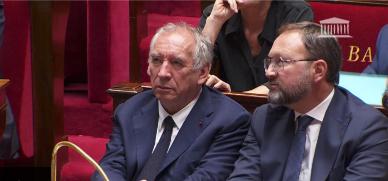Macron cornered as National Assembly ousts Prime Minister Bayrou

The National Assembly voted by 364 to 194 to reject Bayrou, while 25 MPs abstained. The prime minister had himself called the surprise vote of confidence amid mounting opposition to his budget proposals.
France has been thrown into political turmoil after Prime Minister François Bayrou was ousted in a no-confidence vote in parliament, collapsing his minority government and leaving President Emmanuel Macron facing limited and difficult options.
The National Assembly voted by 364 to 194 to reject Bayrou, while 25 MPs abstained. The prime minister had himself called the surprise vote of confidence amid mounting opposition to his budget proposals. His defeat was widely expected, but the scale of the rejection raised questions about unity within Macron’s coalition.
Under the constitution, Bayrou must now present his government’s resignation to the president, which he is expected to do tomorrow morning. Until a successor is chosen, he will likely remain as caretaker.
The dramatic vote sparked loud applause in parliament as Assembly President Yaël Braun-Pivet announced, “The National Assembly has not approved [the PM's] general policy statement,” adding that the prime minister is obliged to resign. Bayrou, appearing stony-faced, walked out of parliament and was driven to the Hôtel Matignon, his official residence, with cameras following closely.
Before the vote, Bayrou told lawmakers that the nine months he served as prime minister had been a time of “profound happiness” because his government had worked with “great solidarity and friendship without a single crisis and a single tension.”
Political analysts say the result signals fractures even within the ruling coalition. “It means that even from within the central coalition, probably from the conservatives - Les Républicains - some MPs voted against Bayrou,” Alexandre Kouchner told BBC News. “This means that within the presidential coalition there are already clear cracks and divides, which sort of muddies the water even more.”
Macron must now decide his next move. He could appoint a new prime minister, but finding one acceptable to rival parliamentary factions will be difficult. Last year, a similar search took several weeks. Among names being floated are Socialist Party leader Olivier Faure, former prime minister Bernard Cazeneuve, former minister Pierre Moscovici, Finance Minister Eric Lombard, Defence Minister Sebastien Lecornu, Labour and Health Minister Catherine Vautrin, Interior Minister Bruno Retailleau, and Justice Minister Gérald Darmanin.
Another option would be to dissolve parliament and call a new election, a risky step that could strengthen Marine Le Pen’s far-right National Rally. Macron could also call an early presidential election, though he has repeatedly ruled out stepping down before his term ends in 2027.
For now, France remains with a hung parliament and a deepening debt crisis—two issues that Bayrou’s fall does not solve. Pressure is mounting on Macron to appoint a leader from the left, given that the left-wing alliance emerged with the largest numbers in the 2024 elections, but divisions between Socialists and Jean-Luc Mélenchon’s far-left camp complicate that path.
As the uncertainty lingers, Macron faces one of the toughest choices of his presidency, with each option carrying political risk ahead of the 2027 race.
